Deeper: how to explore our true selves as we really are
28 Sep 2018 | John Richards
John Richards, an expert in Crisis Intervention, personal growth
and author of new book Deeper, reminds us of the vital importance of
self-awareness.
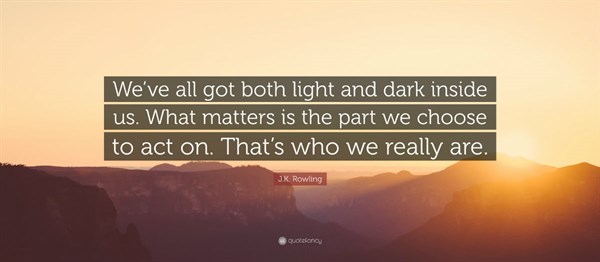
In order to become increasingly aware, one of the
primary things that we must be willing to do is to explore our true
selves; us as we really are.
Although this is an exciting journey - and perhaps the most
powerful one that we can ever embark upon - it is simultaneously
traumatic and must be prioritised in the face of the constant
temptation to stop altogether.
As we discover truths that are unpalatable about ourselves, we
face an enormous battle if we are not to pander to our overwhelming
ego seeking to constantly drag us from reality and back into the
comfort of our complacent individualism.
Our entire modern culture is structured to distract us from
looking at who we really are and the difficult work of our inner
journey, because such work requires the two things that we lack
most: time and
reflection.
Furthermore, humans who are self-aware and understand who they
really are, will not buy and
desire things relentlessly, or give
their time solely to the pursuit of success. Consequently, this
revelation is simply incompatible with what our society requires of
us to maintain its ravenous appetite for our constant spending.

We frantically pursue security and wealth, and yet the
self-attention and nurture that we need most evade us. Modern life
simply steals them from us, and we are not self aware enough to
miss them or to get them back.
A good way for us to understand and measure this phenomenon is
to ask ourselves when we last had an hour alone, undistracted and
quiet, in which we had the opportunity and peace to think about
ourself and how we are doing.
In fact, we become addicted to filling our free time with more
'things' and spend longer at work or on our phones, feeling that we
are 'connected' when the most crucial person to connect to and
invest in; ourselves; is left alone and slowly withers away.
This is why children are infinitely more alive and well than us
- more capable of happiness and joy than adults; because their
inner life and self-communion has not yet had time to be
extinguished.
As they grow older and the emptiness of adulthood in a
materialist culture is forced upon them, they develop the emptiness
that we know only too well. We call it 'growing up' and are
relieved that they stop asking awkward questions when in fact they
are growing numb and blind like us.

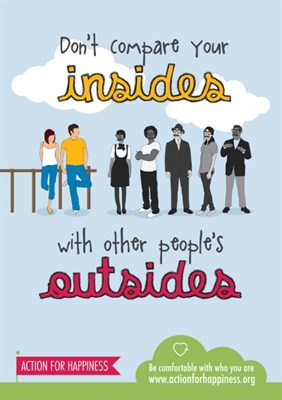
Actually, the greatest and most valuable of all gifts we could
possibly give to our children is to daily exemplify a person who
honestly knows themselves and in that knowledge is able to
consistently demonstrate self-love, self-accountability and
self-nurture.
When I work with parents around this, and think about myself as
a father, I witness the most profound truth: We are aware enough to
know that this is the most important thing of all but we are
rendered helpless to teach it despite our desire and longing to do
so.
Instead, we know that we are unable to teach it because we don't
practice it. We do not have it within ourselves and it can only be
instilled by example.
So it is better to suppress what we really know, and in order to
quieten our guilt, we give our children far too many things and
thus distract them. And then ultimately, when we have made them
suppressing and forgetful of truth just like us, we are surprised
and confused when they develop our same problems, our familiar
issues.
Indeed, the internet, television and the relentless demands of
our busy lives mean that we are constantly bombarded by
information, products and images that monopolise our attention.
Individualism and materialism only need appeal to our hunger:
our ravenous desire to feel better about ourselves driven by the
subconscious knowledge of our true fragility and uncertainty. Then,
we will barely think about anything at all. In fact, we tend only
to give attention to what makes us feel good and what we have to do
next.

This is our humanity.
Consequently, the journey of inner discovery is at best sporadic
and is nearly always only considered in the most extreme conditions
of personal duress, precipitated through conditions such as
personal crisis of some kind: the breakdown of a relationship,
illness, bereavement, alcoholism, depression or psychological
breakdown.
This is because these occurrences tend to simply expose our true
vulnerability and us as we really are and force us to address the
reality of our human fragility and brokenness.
This brokenness and its fruition is invariably avoided or
rationalised by humans at all costs who fear and mistrust it above
all else.
But in fact, it is a great and wonderful gift for those that
have walked its graceful path.
On our journey, primarily we must first face a crucial and
foundational truth about our humanity which few will ever approach
or understand because it is at odds with the way that we like to
live in comfort and complacence:
It is the truth that we are at our core; a paradoxical
being.
We contain both the propensity for tremendous good, and for
great evil. In our deepest parts, we are simultaneously both light
and dark, truthful and self-deceiving, glorious and yet
vulnerable.
And perhaps the fundamental wound that has harmed humanity most,
is our profound human resistance to such awareness - because we
like to think instead that we are fundamentally good and that
everything is fine, and we desire above all else, comfort and
ease.
And it is this suppression and self-deception that is at the
root of all human evil.
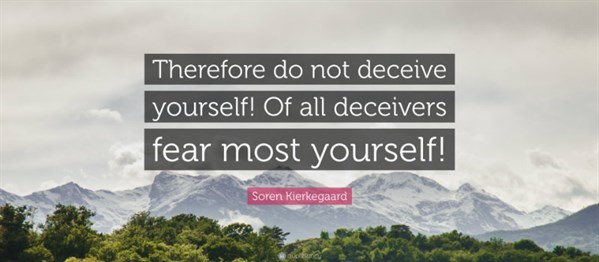
Notice that I don't suggest that our wicked behaviours or
actions are the root of our evil but instead, our refusal to
bravely acknowledge, meet and expose our orientation to that evil
that is at the root of our peculiar lostness.
And the simple reason for this is simply that: the evil that
exists in part of who we are is utterly real, and the consequences
of its outworking (as one cannot avoid in reading the daily news,
or even a cursory study of mankind's history) are catastrophic.
The more that we run from facing such evil and pretending that
it does not live in us, the more we give it overwhelming power.
The defeat of individual human evil is only possible through our
humble willingness to confess firstly to ourselves and then to
those around us that we contain not only light, but also darkness
within.
And this is why true awareness and spiritual wholeness is so
staggeringly rare in humans.
Because it is bloody, painful and difficult.
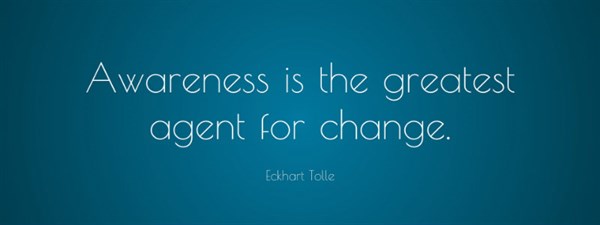
In my behaviours and outlook I find that daily it is
overwhelmingly easier to hide such revelation, and to pretend that
I am OK and good and nothing need be examined or discovered within
and such possibilities should be left alone.
But the very real and catastrophic problem with this simplistic
conclusion, is that it is a only a half truth, one side of an
essentially understood paradox.
We are lovely; in fact, we can be more supremely beautiful than
most of us have ever dared believe even in our wildest
imaginings.
But the key to the unlocking of this beauty is actually
found only in first exposing and then facing the very real darkness
that lives in part of our souls.
This knowledge cannot really be taught. It can only be
discovered; accepted within - and then lived out.
This is Awareness.
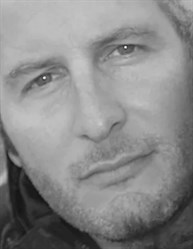
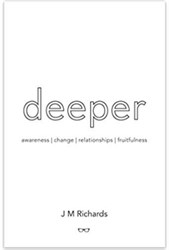
John Richards is author of Deeper. He has worked for years in
crisis-intervention as a peripatetic coach and specialist
practitioner with a wide range of individuals and organisations. He
works to maximise psychological health, self-awareness,
professional integrity and holistic development. Find out more at
www.awarenesschange.com